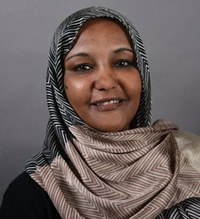Part One
Part Two
Sudan’s 2018/2019 peaceful protests that led to the unseating of the country’s president of thirty years Omer Al-Bashir have galvanized the world’s attention and have captured the imaginations of lovers of freedom and social change worldwide. The role of women and young people has been particularly prominent during the protests. Nada Mustafa Ali examines the meaning of this change for the diverse women of Sudan, and the role women played in resisting Bashir’s regime over the last thirty years. What role can women play in Sudan’s transition, beyond being ‘icons of the revolution’? How can we use our feminist energies to ensure this transition paves the way for social change and transformation that includes gender equality, respect for women’s human rights, and meaningful representation in all structures of governance?
About Dr. Nada Mustafa Ali

Dr. Nada Mustafa Ali is a feminist researcher, teacher, and activist. She is the author of Gender, Race, and Sudan’s Exile Politics: Do We All Belong to this Country? (Lexington Books, 2015), and of many other publications in English and Arabic.